Many initiatives of solidarity are emerging from citizens and civil society in all fields.
A large number of local and regional governments are now coordinating and energizing these efforts to make community action survive in times of isolation. The IOPD is collecting experiences of cooperation between civil society and local governments, some examples of which we summarize below:
In Barcelona, the citizen participation platform of the city council decidim.barcelona receives these days numerous proposals from different groups, in fields such as as sport, culture, education and care.
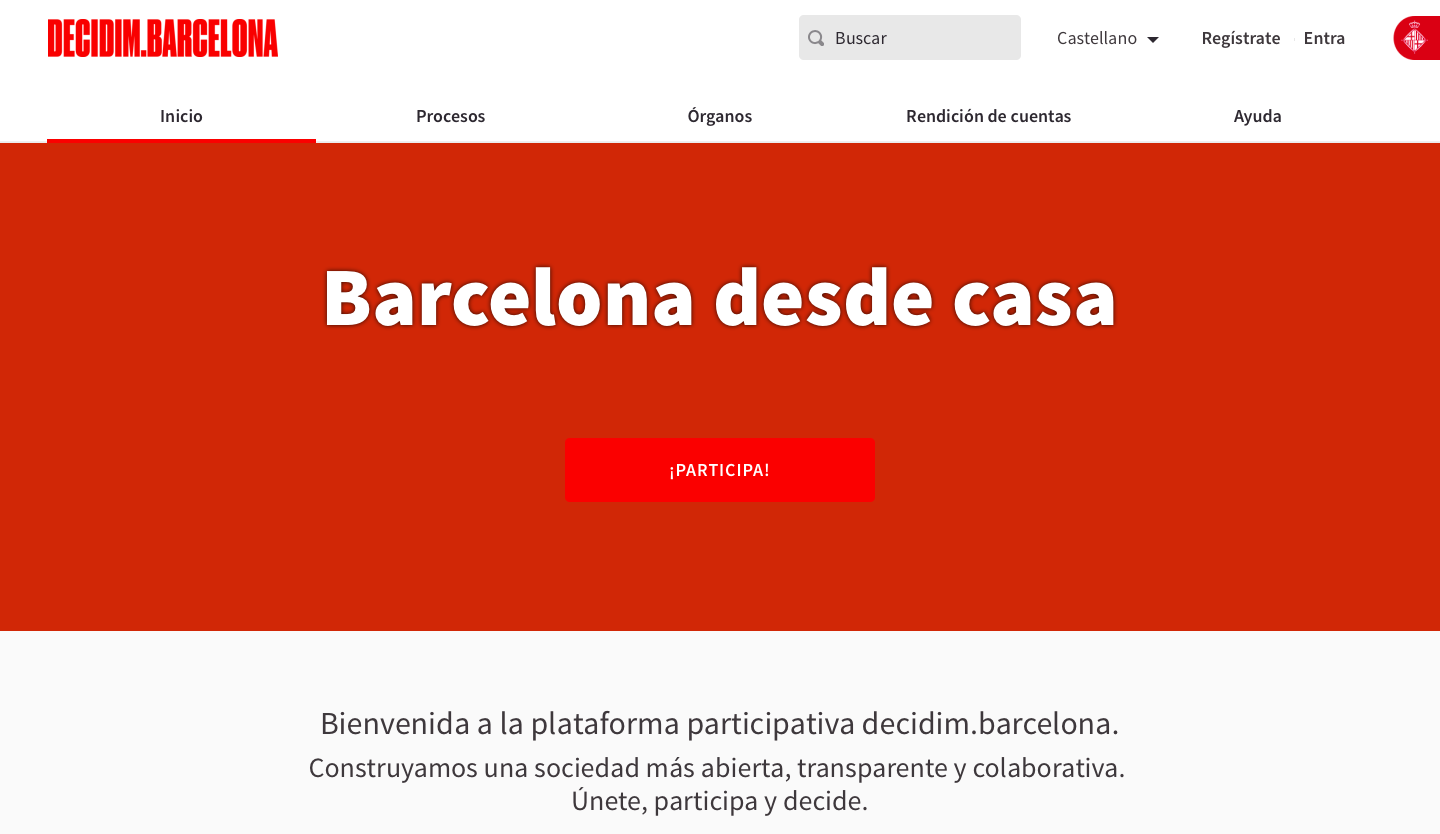
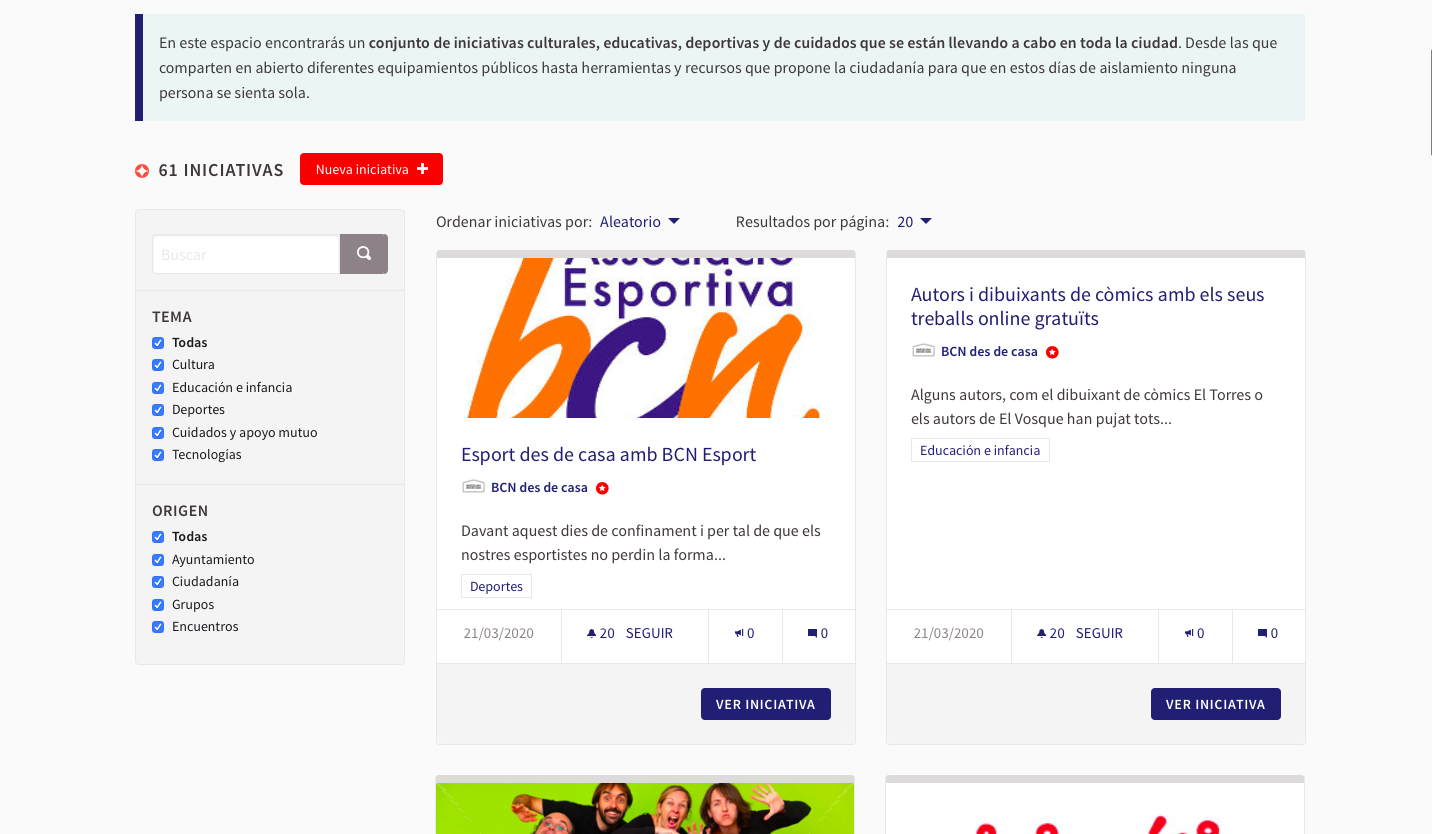
"Grenoble Voisins Voisines", created specifically by the city of Grenoble, emerged as a result of the measures taken by the French Government in March 2020. This platform aims at promoting neighborhood networks to fight the virus by creating a mutual aid system that improves the daily life of residents, reduces loneliness associated with containment measures and strengthens ties of solidarity with the most vulnerable. In doing so, "Grenoble Voisins Voisines" proposes to create "bonds of solidarity" to exchange good advice, help in daily life to their neighbors mobilized for the management of the health crisis or to take care of the most fragile people.
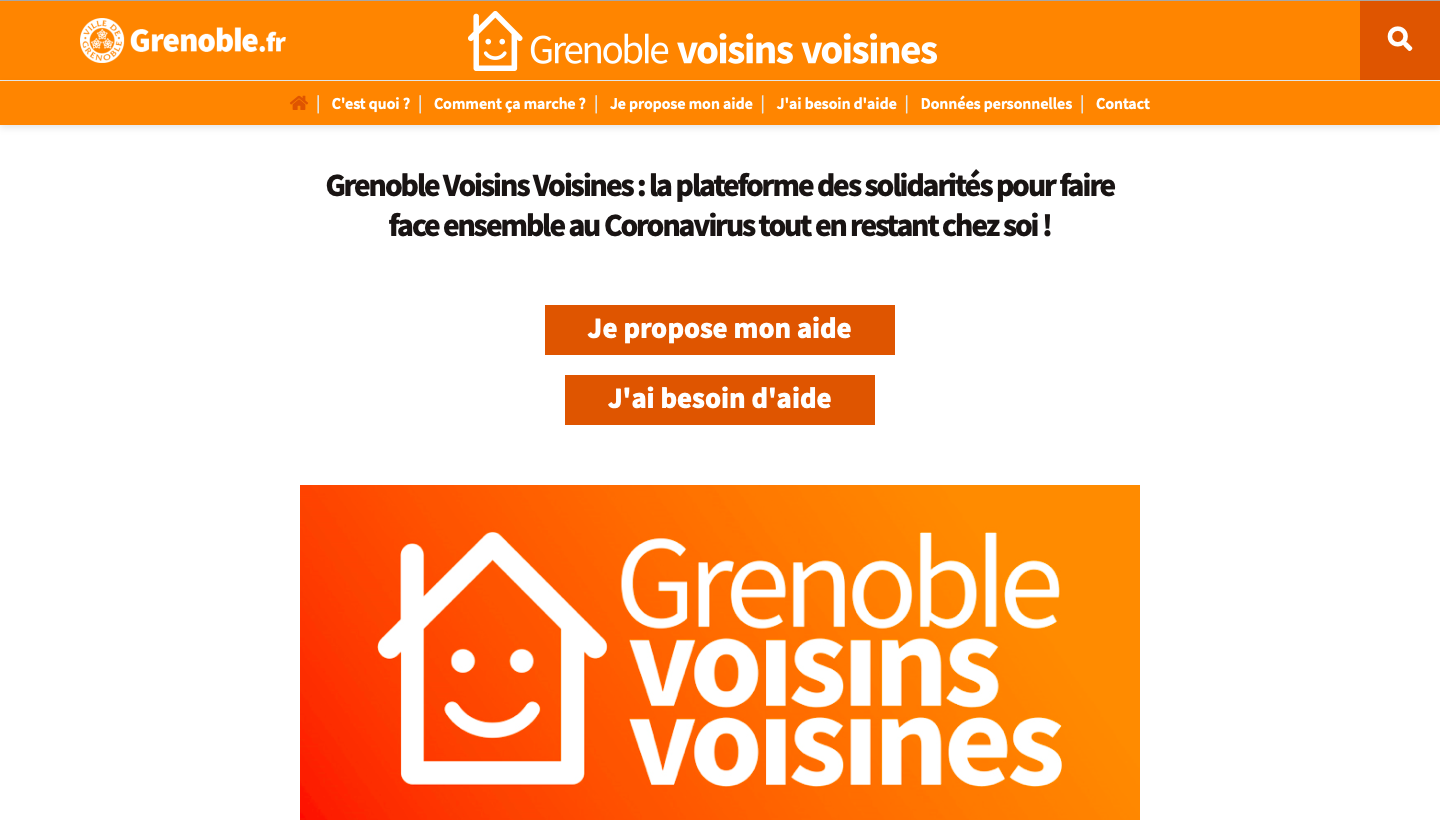
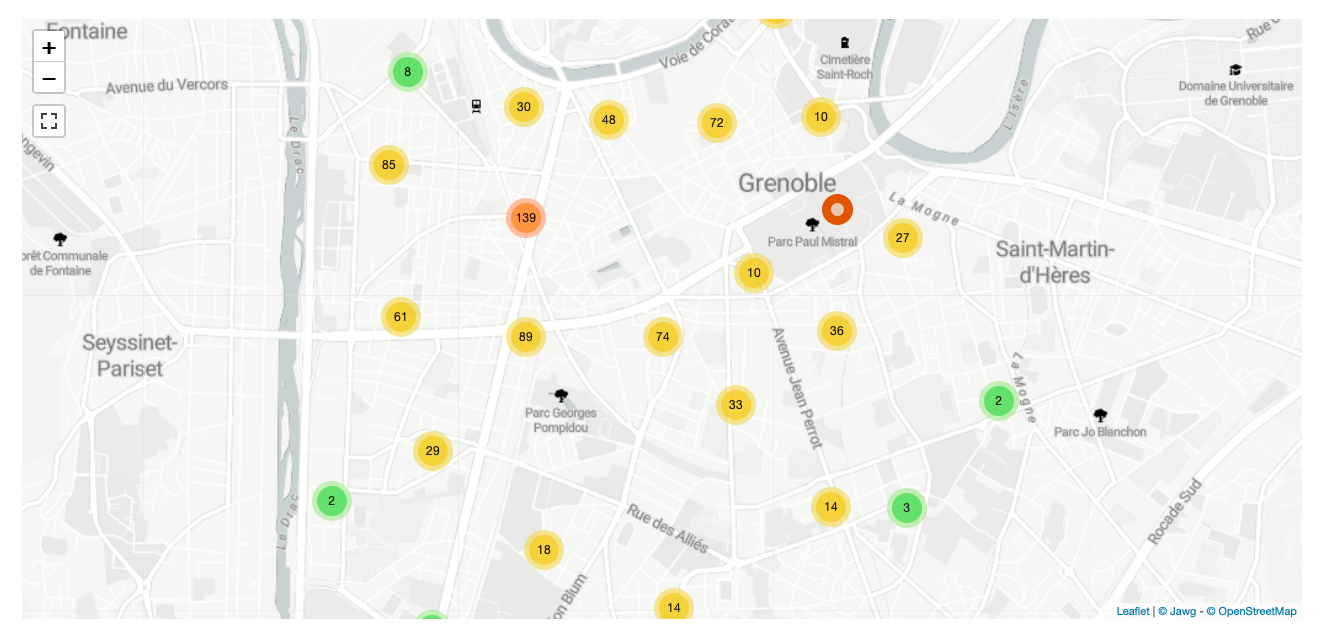
In Mexico City the government is coordinating a medical kit for those infected of COVID-19 in collaboration with the Directorate General for Citizen Participation of the Secretariat for Inclusion and Welfare. The kit will be delivered by 123 Citizens’ Brigades.
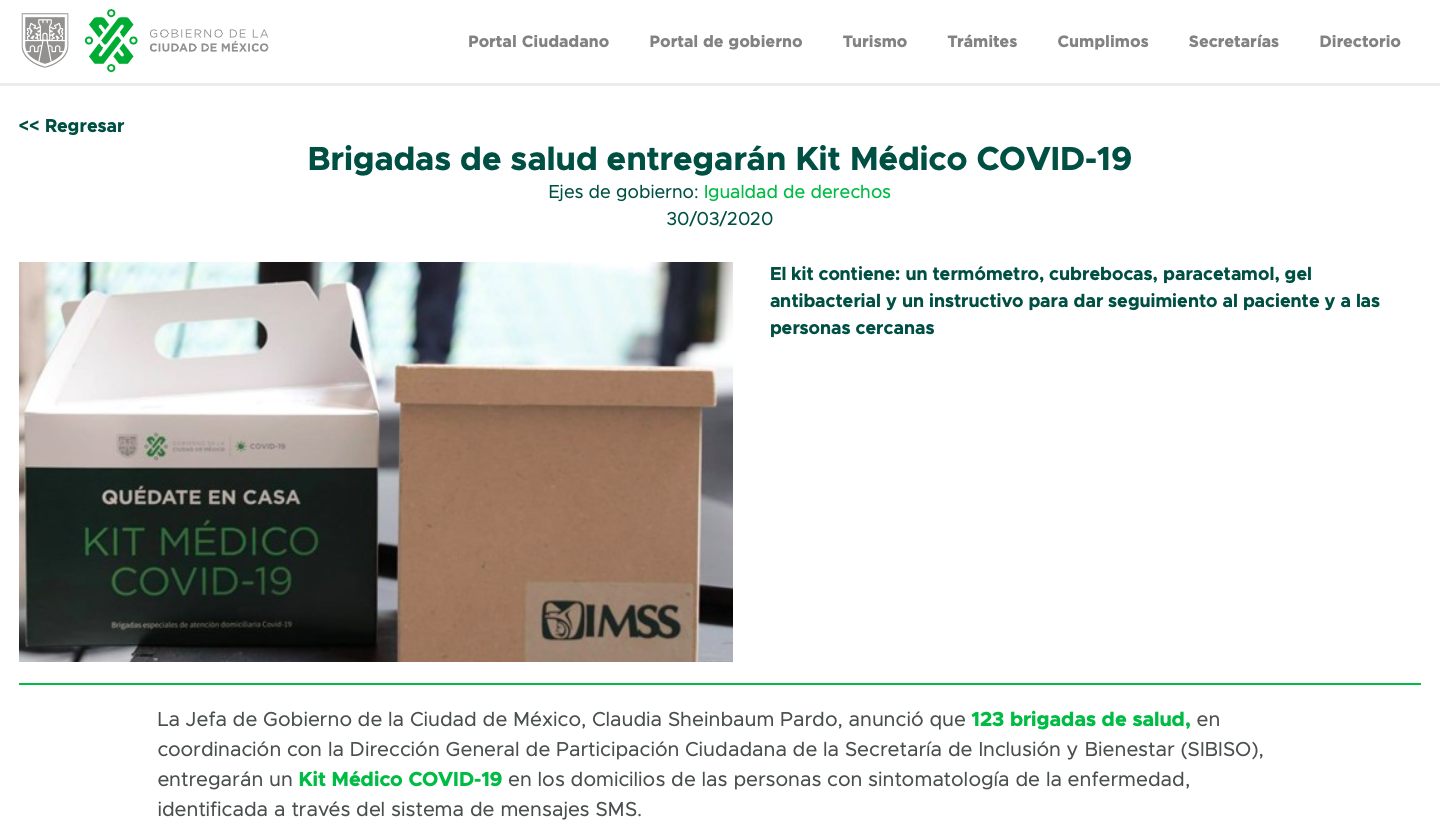
The city of Lisbon is managing a Solidarity Network (Rede solidária de Lisboa) to gather volunteers and support the most vulnerable. Through an online form to be filled by anyone seeking to help, the local government organises citizens’ offers. The different freguesias (parishes) of the city are also organising their volunteers. On the other hand, the city has launched the “Team Loan” campaign, aimed at sharing staff between companies so as to provide those which temporarily need to strength their workforce with extra employees. Check here the full list of initiatives promoted by the Lisbon City Council.
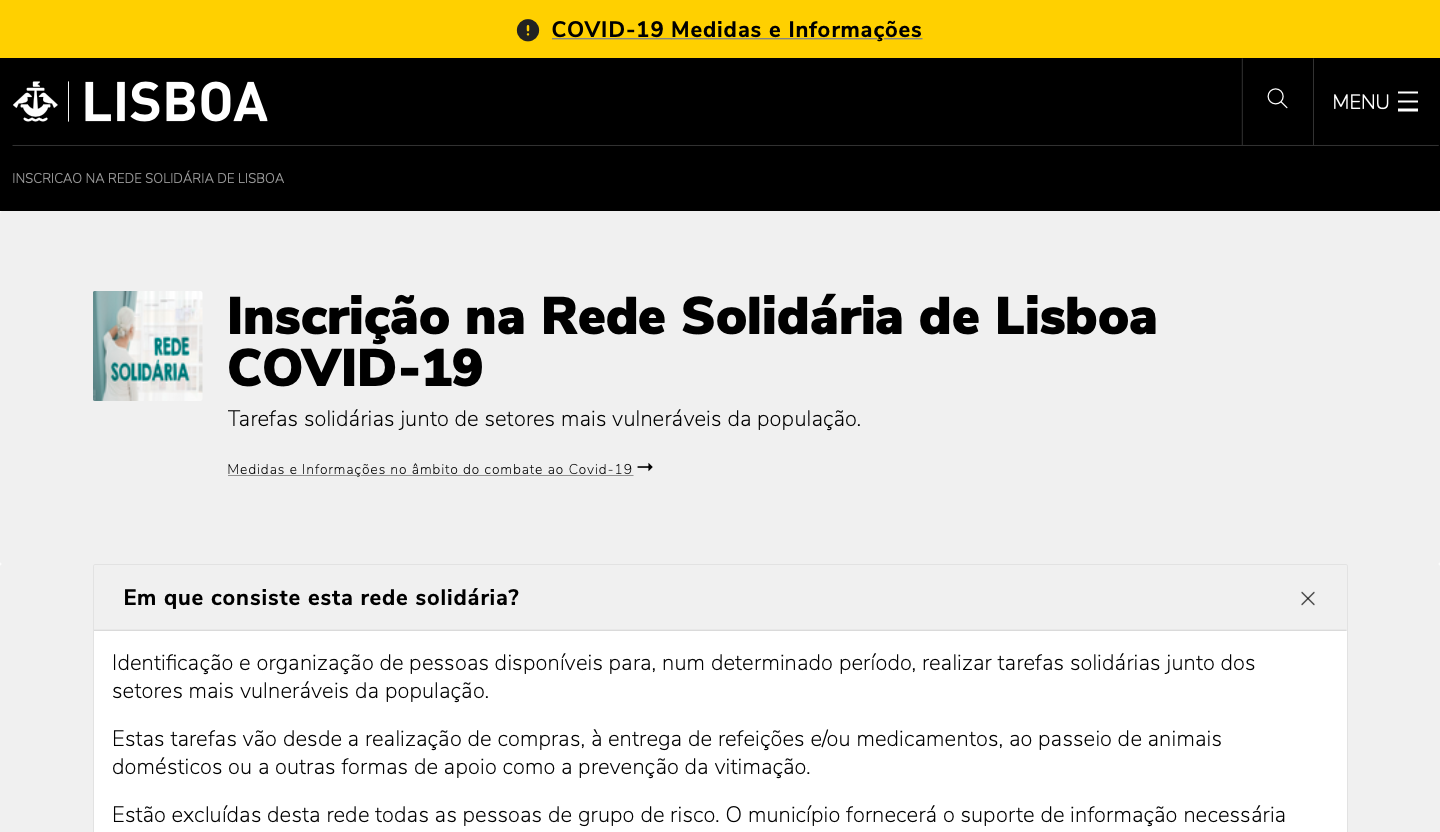
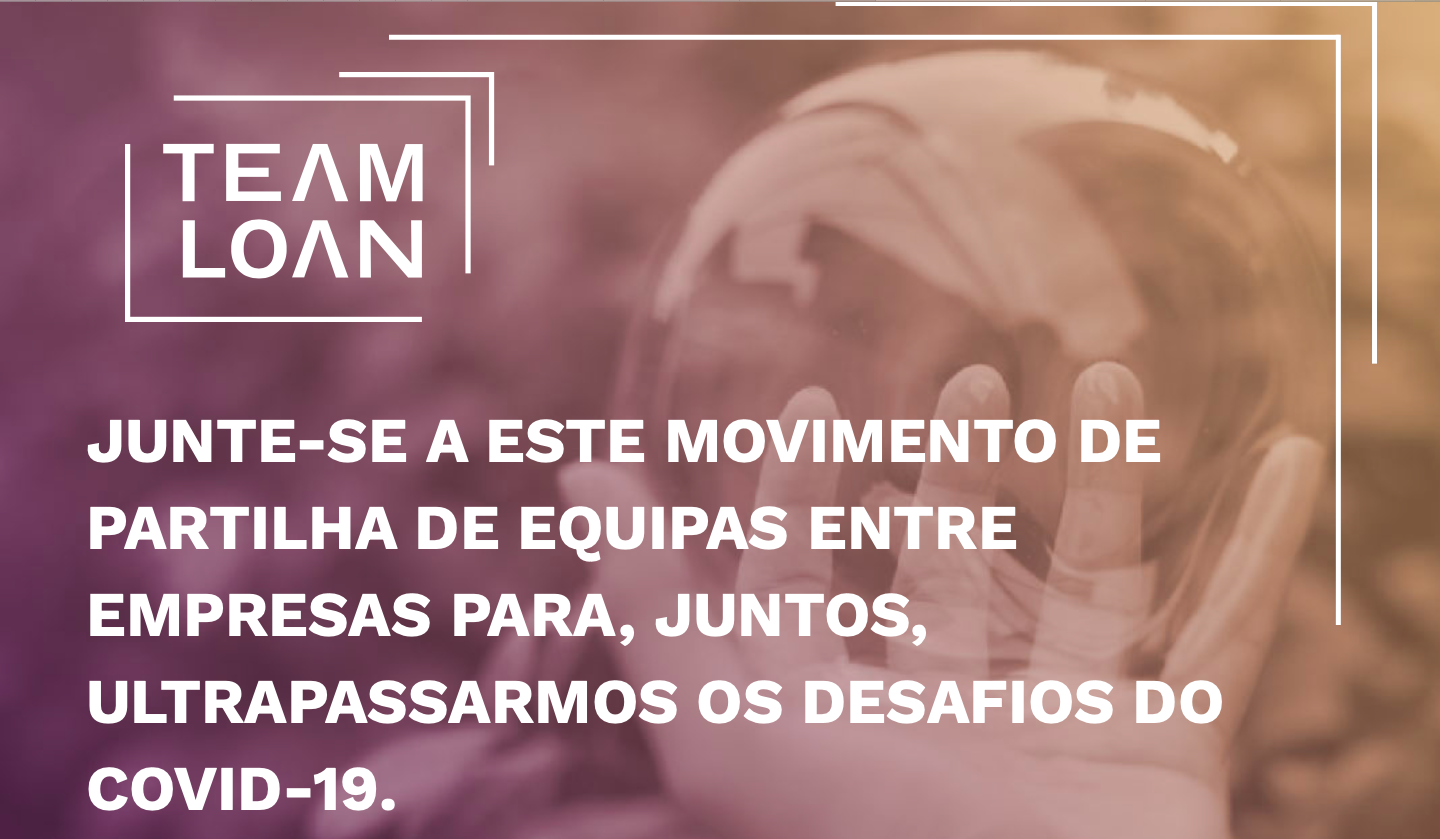
In Paris, the City Council, besides taking all public health and isolation measures, is coordinating the solidarity of citizens to support people at risk, such as the elderly or the homeless. Through "La Fabrique de la Solidarité", the center for the mobilization of the city of Paris in the fight against exclusion by helping associations that are looking for volunteers to help support the most fragile people. Moreover, the city is also managing “Covid-19 : tou·te·s solidaires”, where citizens offer/demand whatever they wish.
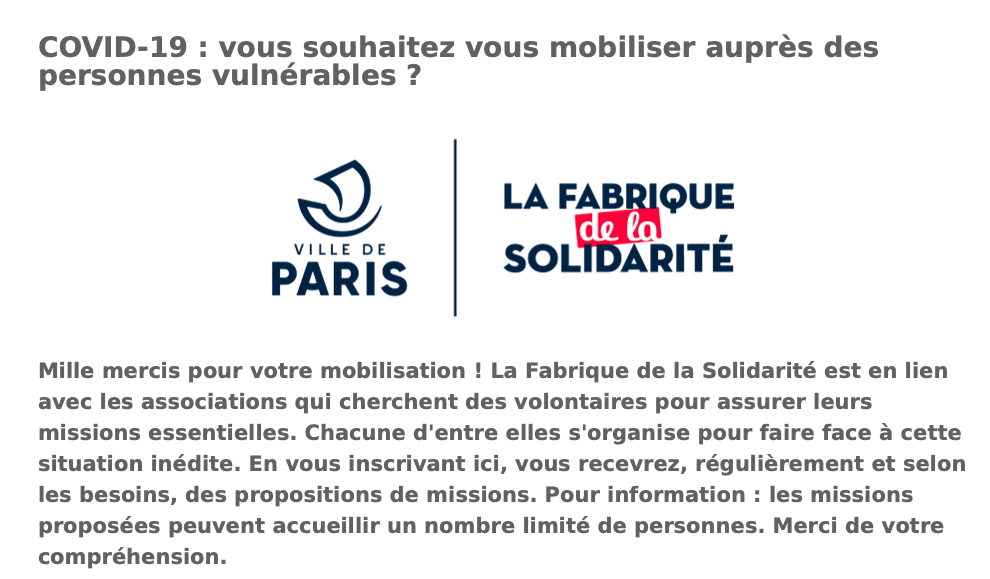
Bordeaux’s citizen participation platform (jeparticipe.bordeaux.fr) has added an “Entraide COVID-19” section, where proposals and offers of help are geotagged. In addition to current aid programmes against COVID-19, the city council has has created a crowdfunding campaign for an emergency fund to provide the most vulnerable with food and hygiene kits.
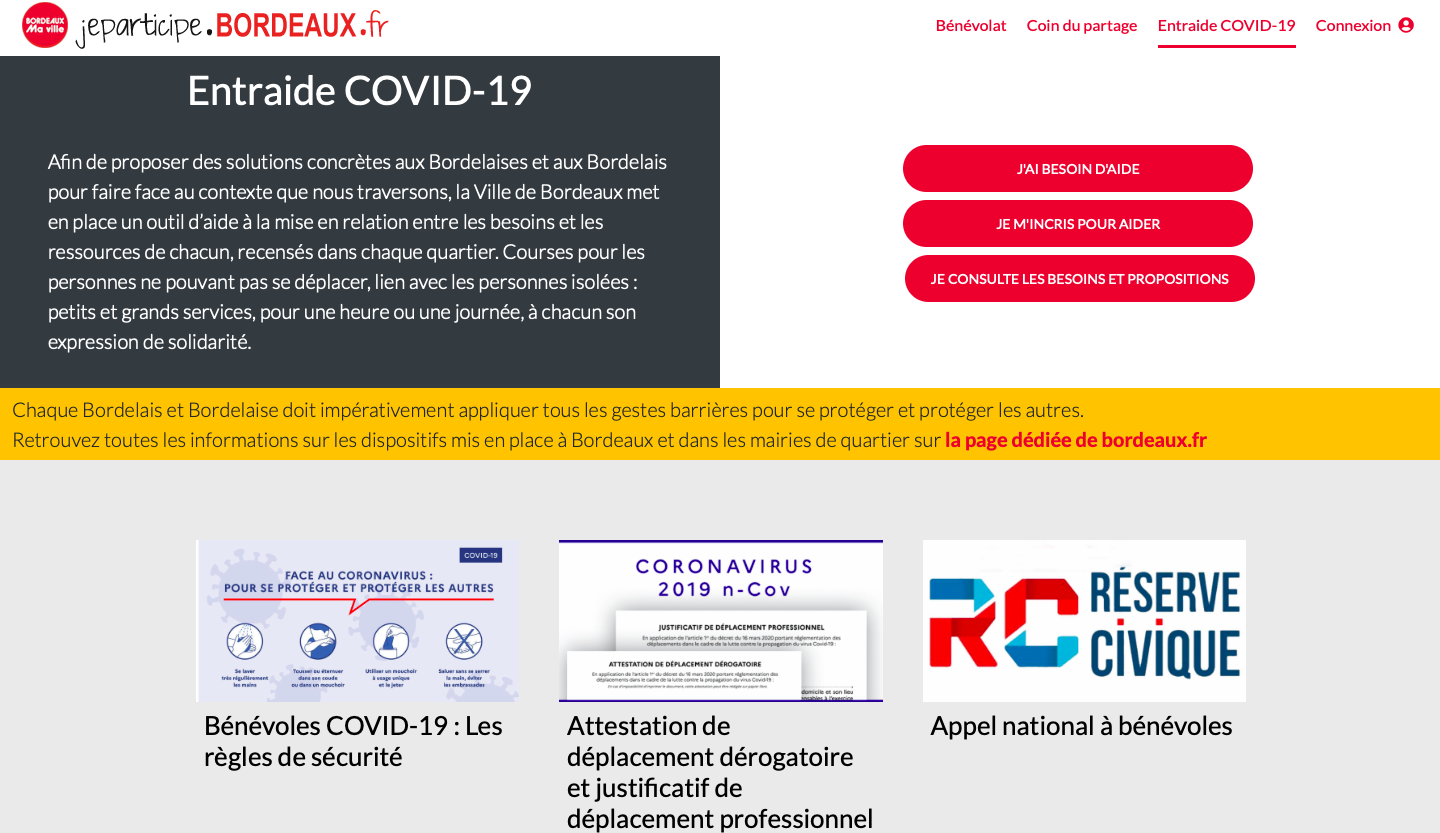
In Berlin, the city council has implemented a system to organize neighborhood help within everyone's reach, including those without internet connection: in case one needs help with, among many other things, their groceries, medicines or pets, one only needs to call the number and enter their post code and type of request. This is automatically published on a web page, sorted by area. The website can be accessed by volunteers who can directly contact those in need.
In Madrid, the city council has created the space “Madrid goes out on the balcony” to organize citizen proposals during the pandemic within its participation platform. The portal is open to private citizens and also to city associations. Besides citizens’ self-organized initiatives, the city council has launched a campaign to boost already-existing neighborhood solidarity: to this end, it has launched a standard sign that anyone can print and fill in to the put it up in the lift or any other common area, so that your neighbours know what kind of aid you offer, ranging from shopping to merely talking on the phone with someone to avoid the social isolation of the most vulnerable.
In Rome, the Sparwasser association quickly organized to help the elderly make the purchase, and to provide means for workers who must telework but do not have the means, among other initiatives. Similar initiatives have been replicated in the rest of the country.
The Helsinki City Council has launched an express aid campaign that includes the possibility of receiving up to € 5,000 for each innovation proposal in citizen aid.
In Tirana, Albania, several initiatives have surged. Youngsters are helping the elderly thanks to the campaign “Adopt a grandparent” (#AdoptoNjeGjyshe).
In Sofia, the city council is receiving offers of help from citizens, who are set to join the voluntary formation of the Sofia Municipality, which is aiding the elderly to get food and medication around the city.
In Kazan, the city council promoted several experiences in cooperation with the civil society: a 500+ people volunteer named “Help to elderly people” managed to deilver over 17,000 food baskets by late May to the most vulnerable population. Volunteers enjoy free gas/public transportation as long as the self-isolation regime is activce.
The City of Buenos Aires has also launched a volunteering platform to help the elderly, where anyone can sign in online. It also provides plenty of information material for volunteers.
In Bogotá, the city council, together with several civil society organizations, has launched the Hackatón #MOOVID19 (Hackathon) contest. Citizens share data analysis proposals on how to improve the organization of public transport to serve those who need to use it and avoid contagion. The awarded proposals will be implemented by Bogotá’s District Secretary of Mobility. The City Council has also activated a special website called “Citizen Care” (Ciudadano Ciudadano). Citizens can share verified information make donations, and offer/demand help for groceries, medicines, transport, education, psychological and legal advice, among many other things.
In Montevideo, different areas of the municipal government have coordinated the new platform “AcaEstamosUy”, which allows to connect and geotag people facing difficulties due to the crisis and those who can help them.
In Medellín, “Súmate” is the official COVID-19 solidarity site of the municipal government. Citizens can offer their help and make donations. Moreover, individuals can share their “talents” to organisations who might need them.
In Porto Alegre (Brazil), a thousand people have already joined Brothers in Arms, a platform against COVID-19. In coordination with the Municipal Health Secretariat of Porto Alegre, they are helping to handle the shortage of PPE (Personal Protective Equipment): purchases, collection, delivery to hospitals, 3D printing…
On the website of the Municipality of Rosario (Argentina), which contains all the relevant information for citizens, one can also ask for / offer help, make donations, enrol as a volunteer and share innovative projects in the fight against the virus.
Citizens of Toronto will find a “How you can help” section on the municipal site: donate, spread the word, become a supplier of needed goods and services and report non-compliance are the types of collaboration the government is coordinating.
In Ottawa, the city council encourages community action and a grassroot initiative named #ViralKindness has emerged, consisting of filling a sticker with your contact information to offer your help to people nearby. The City of Ottawa also provides help through the Distress Centre of Ottawa hotline and recommends buying local to help citizens.
Philadelphia is coordinating volunteer help from across the city through its website, where one can find information about the City's Aid Fund, volunteer opportunities, as well as an external app to connect restaurants to surplus and people in need.
In Ouagadougou (Burkina Faso), the DES-ICI (Plateforme Démocratie Sanitaire et Implication Citoyenne), in collaboration with 23 civil society organizations, has created the "Mouvement Social Comvid Covid-19". This movement is made up of volunteers who fight against the spread of the virus in the city's neighbourhoods by raising awareness among the population, implementing collective protection measures and promoting community innovation to mitigate the impact of health emergency measures.
In Béjaïa (Algeria), several volunteer associations, together with the Directorate of Health and Population (DSP) and Directorate of Social Action (DAS) are managing a shelter for the homeless in a space offered by the owner of a festival hall. Food is also being provided.
The government of Seoul has published an English-language site called “Cities Against COVID” with plenty of information about the management of the crisis: daily news, government measures and a open discussion forum for other cities to post their experiences and share expertise. Seoul, home of a quarter of South Korea’s population, is also in the spotlight due to the government’s measures against COVID-19: focused on transparency (data collected for COVID-19 patients are shared publicly) and community trust (which has been achieved by trying not leaving anyone behind, e.g., loaning internet devices to low-income students, providing financial support to vulnerable communities). More information here.
In Nîmes (France), neighbours have organised “solidarity baskets” following the example of Naples. The basic principle is: “if you can, leave something; if you can’t take, something”
The Naples City Council has set up a Municipal Solidarity Fund, to which citizens can add donations. This fund is now being allocated among to those in need among the inhabitants of the city. More information about the process here.
Applying containment measures, while easing the lives of the inhabitants. This is the objective of the City Council of Nantes when addressing the health crisis which is affecting the country. Given the spread of solidarity initiatives and actions in the last hours, the city launched the Facebook group “Nantes entraides” on Friday afternoon to coordinate all the good ideas.
In Poland, the city councils of Gdańsk, Gdynia and Sopot officially supported an initiative consisting of a hotline to allow those who are excluded from the digital world to do their groceries.
The government of Aragon (Spain) has opened a section on its citizen participation platform for information on the elaboration and distribution of facial protective screens (homemade masks) to provide (non-health) workers in contact with the public workers with, and thus minimize the risk of transmission amid the shortage of personal protective equipment (PPE). In addition, the city of Zaragoza (Aragon) has enabled a specific platform "Zaragoza Helps", to geolocate all volunteer offers.
The Alcobendas City Council (Madrid) has created a space on its website to share neighbourhood, association and institutional initiatives. Among these, the Infanta Sofía Hospital has encouraged citizens to write letters by e-mail to those admitted, to be handed by nursing staff.
In Terrassa (Catalonia) the city council has elaborated a database of volunteers and a database of firms, associations and other entities which offer their help.
In Granollers (to the north of Barcelona), the City Council has made available a website called "Xarxa Ciutadana", so that citizens and organisations can share solidarity initiatives. The site offers proposals of actions to be carried out in the community and a poster to assist the creation of these collaborative networks, as well as a space where all the initiatives are collected and a form to send those that citizens and entities wish to share.
The municipal government of Chia (Colombia) has developed the CHIAPP, through which anyone can make donations or request assistance. In addition, citizens can inform authorities about dangerous events (such as crowds), or about increased prices groceries and other basic products. The Secretariat for Citizen Participation and Community Action has also been assisting the presidents of the Community Action Councils to identify risk situations and vulnerable families in each neighborhood, in order to strengthen solidarity and the social fabric in the municipality.
In Busto Garolfo (province of Milan), the town council has is managing a free-delivery service for food, medicines and other basic necessities, in collaboration with the municipal social services.
In the province of Vicenza (Veneto), the Voluntary Service Center has created a platform for citizens, associations and institutions to share and spread their initiatives throughout the territory, especially aimed at the most vulnerable groups. All these actions are geolocated and classified on its website.
In several cities from the German state of Thuringia, solidarity initiatives between neighbors are mushrooming: besides help to buy and collect medicines for the elderly and risk groups, cargo bikes for the youngster to do these errands are being offered, as well as babysitters to take care of the children of those who can not work from home.
In Cluj-Napoca (Romania) the city council wants to ensure the right of information by means of a platform where citizens can attend online council sessions.
The French department of Haute-Garonne has launched a consultation process for its citizens to decide how they want the post-COVID-19 society to look like. Taking this opportunity, the process will tackle issues not only related to public health but the organisation of society as a whole. More information at “Société d’après Haute-Garonne”.
In Brest (Brittany) the city council has started to post advertisements and signs to promote help between neighbors for shopping, pets, childcare, homework and prints.
The city of Angers (France) has also created its “Entraide COVID-19” site, in line with many other cities.
The network #PourEux has been set up in some fifteen towns and cities in France. It is a citizen solidarity movement that serves and delivers meals to the homeless. Amateur cooks are connected with improvised volunteer riders to deliver these meals.
In the United States, the “Weaving Community During Crisis” movement promotes and facilitates conversations and video calls, and has a forum for anyone to contribute with ideas on how to provide care to those around us.
In the United Kingdom, many town councils are recruiting volunteers to ensure support for the most vulnerable sectors of the population in the face of an imminent saturation. The website of the Local Governments Association (LGA) collects all the necessary information for local entities to prepare in this regard. In addition, numerous associations and NGOs at the local and neighborhood levels have organized the joint campaign "Community Action Response", whose aim is to make raise awareness of the need to be attentive to those around us and help the most vulnerable.
Community aid has boomed in Italy, the first European country to enforce confinement, and Covid19italia.help already lists hundreds of offers in Italy and Europe for help or tips.
In Taiwan, a non-profit fact-checking organization named “Taiwan FactCheck Center” relies on citizen participation to fight against disinformation and rumours. Anyone can send the centre information to double-check its truthfulness.
In Georgia, the Support Business platform has been launched with the aim of getting SMEs (small and medium-sized enterprises) to share the challenges they are facing and try to find a solution for them.
The Open Government Portal of Haiti has enabled a section for COVID-19. Despite the small number of cases in the country, a space to list future civil society actions against COVID-19 has been activated. So far, the Network of Bloggers of Haiti has launched a platform to geotag infections.
The Network of Associations of Local Authorities of South-East Europe (NALAS) has launched a Special edition of NALAS Digest: Local Response to COVID-19, where they gather the experience of multiple towns facing the pandemic.
In France, a citizen group born upon the start of the coronavirus crisis has created the site “Co-confinés”. Inspired by the Spanish platform “Frena la curva”, a group of common people decided to gather the huge amount of experiences which were surging all other the country. In Co-confinés there are now hundreds of proposals sorted by type, including leisure at home or education but also neighbour help. Anyone can contribute with new initiatives or resources.
Also in France, the platform for delivery of local fresh products cagette.net is offering a COVID-19 urgence kit for those producers who are unable to sell at present. This way, producers can rapidly incorporate to the supply chain in a more ecological way.
At the international level, the platform “Frena la curva” (Spanish for “Stop the Curve” platform has been created, which thanks to a geolocation system organizes citizen initiatives and offers / requests for help among neighbors throughout the territory. Currently it has been implemented in Spain, Brazil and Ecuador, and is in the process of expanding to other European and Latin American countries.
If you know of any other experience of citizen collaboration in the context of this health crisis, which linked to local governments, do not hesitate to share it with us via email to info@oidp.net